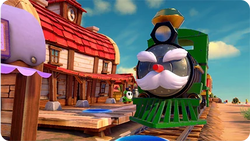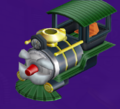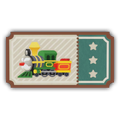Steamer
| Steamer | |
|---|---|
 Steamer in Super Mario Party Jamboree | |
| Species | Train |
| First appearance | Mario Party 2 (1999) |
| Latest appearance | Super Mario Party Jamboree (2024) |
- “Hit the block and choose a direction, would ya? A Goomba will be a-sendin' ya backwards.”
- —Steamer, Mario Party 2
Steamer is a steam locomotive found only in some of the games of the Mario Party series. He speaks with a Southern American English accent, particularly that of a precious metals prospector, and is usually seen lugging a small wooden train car behind him on which characters can stand as it moves about. He also has a lamp on the top of his "face," a red "nose" where a unit number would appear on a normal steam-powered train, and a thick gray mustache with matching eyebrows (while not having visible eyes), giving it the appearance of an elderly person. He is the main attraction in Western Land in Mario Party 2, where he makes his debut. The characters can ride Steamer by hitting a block. If the character hits the block and gets a Toad, Steamer goes forward, but if a Goomba appears, Steamer goes backward. Riding Steamer allows characters to move farther than they normally could with hitting the Dice Block. Characters who are on the track and get hit by Steamer are sent back to the start of the map. Since Mario Party 2, Steamer has been associated with ramming into characters and sending them flying. When on the move, Steamer makes a sound resembling that of a high-pitched train whistle and steam shoots from its sides.
Steamer makes a cameo appearance in Mario Party 3 in the Duel minigame End of the Line. In this minigame, the players get knocked onto his trailing car and must guide him through three pairs of tunnels to safely make it to the station, where one tunnel leads them off a cliff and the other keeps them on the track.
Steamer makes another, minor cameo on the Mario Party 4 board Toad's Midway Madness, where he moves around the train tracks in the background.
In Mario Party 5's Super Duel Mode, the player can assemble a machine that heavily resembles Steamer by combining the Choo-Choo Body, Choo-Choo Tires, and Choo-Choo engine. These parts together provide high speed and very poor control, stats that are consistent with Steamer's behavior in the other Mario Party games.
In Mario Party DS, a toy Steamer makes an appearance in the 1-vs-3 minigame Track Star. One player stands on the toy train, and the rest stand on the rails and try to escape him.
Western Land returns in Super Mario Party Jamboree, and Steamer can be seen parked at the station closest to the starting position.
Gallery
A Koopa Troopa rides Steamer in the opening preview of Western Land.
Mario hitches a ride on Steamer on the lower segment of Western Land
Steamer in End of the Line
The toy Steamer in Track Star
Steamer on the Steamer Ticket
Names in other languages
| Language | Name | Meaning | Notes |
|---|---|---|---|
| Japanese | シュッポー[?] Shuppō |
From「シュポシュポ」(shupo-shupo, an onomatopoeia for the sound of a departing steam-engine train) | |
| French | Loco[1] | From "locomotive" | |
| German | Dampfbert[2] | Portmanteau of Dampf ("Steam") and the given name Albert | |
| Italian | Ciuf Ciuf[3] | Choo Choo | |
| Portuguese | M-fumaça[4] | From Maria-fumaça (lit. "Smoke Mary"), Brazilian colloquialism for steam locomotives | |
| Spanish | Vapor[?] | Steam |
References
- ^ "Tout le monde à bord de Loco ! [...]" – description for Western Land. Super Mario Party Jamboree. Nintendo (French). Retrieved September 28, 2024.
- ^ "Tschu-tschuuu! Bitte alle einsteigen, Dampfbert wartet schon![...]" – description for Western Land. Super Mario Party Jamboree. Nintendo (German). Retrieved September 28, 2024.
- ^ "Ciuf-ciuf! Tutti a bordo! Prendi il biglietto del treno Ciuf Ciuf, muoviti sul tabellone a tutto vapore e non dimenticarti di fare sosta al bar di Torcibruco. [...]" – description for Western Land. Super Mario Party Jamboree. Nintendo (Italian). Retrieved September 28, 2024.
- ^ "U-uuu! Todos a bordo do M-fumaça![...]" – description for Western Land. Super Mario Party Jamboree. Nintendo (Portuguese). Retrieved September 28, 2014.
| Mario Party 2 | |
|---|---|
| Main characters | Mario • Luigi • Princess Peach • Yoshi • Wario • Donkey Kong |
| Other characters | Bowser • Toad • Goomba • Boo • Koopa Troopa • Thwomp • Kamek • Whomp • Big Boo • Mr. I • Mushroom Genie • Steamer • Snifit Patrol • Shy Guy • Sushi • Baby Bowser • Woody • Professor Fungi • Battle T. • Totem Bros. |
| Items | Mushroom • Skeleton Key • Plunder Chest • Dueling Glove • Warp Block • Golden Mushroom • Magic Lamp • Boo Bell • Bowser Suit • Bowser Bomb |
| Spaces | Blue Space • Red Space • Item Space • Happening Space • Battle Space • Bowser Space • Star Space • Chance Time Space • Bank Space |
| Boards | Pirate Land • Western Land • Space Land • Mystery Land • Horror Land • Bowser Land • Rules Land |
| Other | Crazy Counting • Dinky Rinky • Goodness Rakes • Melon Mayhem • Nomiss • Gallery • Mario Land • Media • Minigames • Pre-release and unused content • Quotes • Sound test • Staff |








